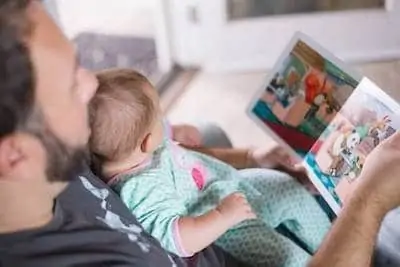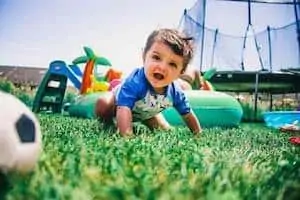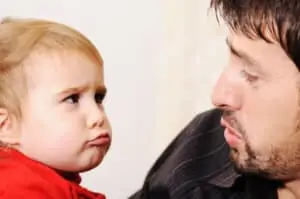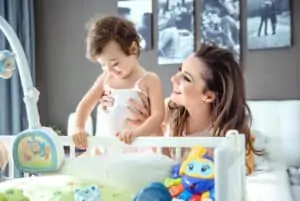The other day, I was listening to Dr. Cindy Gellner on The Scope. She has a segment called “The Healthy Kids Zone” which is always informative.
It caught my attention simply because I’d received some recent messages about speech development in toddlers, and quite a few mamas were asking about how to encourage speech in a toddler.
I’d been busy compiling a list of games to help toddler talk happen, including activities for toddlers with speech delay when I found Dr. Gellner’s discussion about speech development.
So, what did she have to say? You can listen to her directly in the link provided above, but to summarize:
- When a child coos or babbles, these are the very earliest stages of speech development.
- Around 9 months, the sounds come together, so they will say things such as “Mama” (yay!) or “Dada” even if they don’t fully understand what they’re saying.
- Just before 12 months of age, babies need to be attentive to sounds and show signs of recognition when you name everyday objects (this is usually around 9 months of age).
- Hearing loss may be an issue if your baby watches intently but doesn’t react to the sound (a checkup with the pediatrician should help you with this).
- Somewhere around 12 to 15 months, your toddler should have more range in their babbling with sounds coming from b, d, m, n, or p. You may find they’re saying things like “ball” and, of course, every parent’s favorite word, “No!”
- By 18 months, most toddlers can say around 20 words. By the time they turn 2, they should say 50 or more words.
- By age 2, children combine words to make small sentences of two words.
- And by age 3, your child should be saying sentences with 3 words.
My Experience with How to Encourage Speech in a Toddler

My eldest was learning 2 languages right off the bat. We were told it might take her a little longer to say her first word because she was processing both languages. However, research seems to show this doesn’t have an effect.
In my experience, though, my eldest started speaking toward the end of the normal babbling time frame for toddlers. And she hasn’t stopped talking since!
Our chatterbox took off from there. We read to her all the time, and we all talked to her endlessly with a running monologue when she was a wee thing.
Once she started talking, we couldn’t stop her. Meanwhile, my youngest seemed to talk in a more adult way at a much younger age. For her yearly checkup at the pediatrician when she was 3, she was speaking 7-word sentences. The pediatrician stopped checking her reflexes and began engaging in conversation with her.
Afterward, he told me about all his years. He has never seen a child her age speak in such comprehensive sentences. All I did was talk to her all the time. I guess she picked up on everything I said.
Anyway, the bottom line is that if your baby babbles a lot and continues to string words together, they will be fine. You can do activities to help toddlers with speech. But what about those with a speech delay? I’ve got that covered below, so keep reading.
How can I get my toddler to talk?
If your toddler is at the beginning of the talking period, you can do quite a lot to encourage their conversational skills. Here are what you can do with your toddler to get them chatting up a storm.
Read to them all the time
I must admit that before my daughters were born, I read to them while they were in the womb. Now I have 2 girls that sit and read by the bedside light, chapter books too.

When they were each wee little babies, I’d sit them in my lap and point at the words as I read. I’d also point at the pictures. Sometimes, I’d even make voices and really ham it up. Reading to your child is one of the best overall things you can ever do. Plus, when they’re too big to sit on your lap someday (it will happen!), you will treasure these moments the most.
Create a running monologue
It seems weird talking to a baby, but if you have pets, you likely speak to them too. You can talk to babies and toddlers about the most mundane things. Narrate what you’re doing, how you feel, and all that good stuff. Pretend you’re on a reality TV show. Kids pick up what we say, and though when they get older, they’ll pretend they don’t hear you, believe me when I say babies and toddlers hang on your every word.
Sing and rhyme
Singing and rhyming are a fun way to get your toddler talking too. When you run errands, pop a CD in the car for kids’ songs, like this one of Toddler Favorites. Download it to your phone too…whatever works for you. Put it on at home and do a dance and sing-off party.
Engage in word building
When your toddler says a simple word, this is the perfect time to build on that word. Think of it like when you dated that strong, silent type of guy back in college. The one who’d say one word, and you’d go on and on dragging the conversation out. Only this is way more fun. And cuter!
So, if your child says “car,” you can round that out by saying more about what you see. “Yes, it’s a red car,” for example.
Be responsive
For the little bit of babbling or talking your child puts out there, encourage them by showing you’re listening. Look at her, smile at her, and be sure to praise her too. Kids want more praise, so they will repeat the actions that earned them the praise in the first place.
Play games
Games are a great way to get your child chatting it up. You can do some anywhere, perhaps while waiting at the doctor’s office, in the car, or while you’re at home too.
I used to love saying to each of my girls, “Hey, is this my nose?” I’d point to everything else, and they would laugh and laugh. “No! Leg!” I still hear the laughter. Have fun with it.
Another one was to wave hello and goodbye to everyone and everything. Get into it, too, and be silly. “Hello, stove! Goodbye, car!”
Speaking of cars, every child should have some. They’re so fun, and they can be the bridge for that speaking gap. Push them along up and down ramps, over the floor, or books. And narrate as you do. Make car sounds. Your child will be encouraged to play along.
And just say it because kids will repeat what you say eventually. If you spill something, say, “Uh oh.” If your kid is eating, have a snack with them and say “More” when your plate is empty. These are just a few examples out of hundreds you can do to encourage your toddler to speak.
You can also buy toys that have this exact purpose. In China, I didn’t have anything like this. My in-laws purchased a chart for the wall that had fruits and vegetables in English and Chinese. However, the English was sometimes wrong. Oh well.
One I found was this Funshpiel Electronic Learning Book. It has fun ways to learn and encourages learning new words too. HISTOYE also makes a learning tablet that looks like loads of fun too.
We did get a stroke of marvelous luck when we met some expats moving back to their homeland of Australia. They had a yard sale, and we had come about something else they were selling. The mama looked at my kiddos and said, “Here, we’re just giving these things away. Enjoy!” One of them was a dollhouse my eldest clung to with all her might.

The other was this Fisher-Price learning laptop. The one in the link is a newer version and likely doesn’t speak with an Aussie accent as ours did. But my youngest loved this toy. We brought it back with us when we moved home to the US, and hopefully, when we donate it after our littlest gets too big for it, someone else will adopt it and find fun and learning in this toy.
These activities will all help your toddler talk. But what do you do about a toddler with a speech delay? That’s below, so read on!
What is a late talker?
They define a late talker as a child between 18 and 30 months who develops typical play, thinking, motor, and social skills but has a limited spoken vocabulary for the age. Late talkers have all the tools in their minds for spoken language, although they don’t talk at all or say very little.
Research thus far has found it’s more likely that a late talker has a family history of this. They tend to be male and born underweight or before 37 weeks.
If your child is a late talker, do not worry. You can do activities to encourage speech and language development. Your pediatrician can also help calm your fears about this. There is help, and you’ll be able to find it.
How to help a child with a speech delay at home?
The following are activities for toddlers with speech delays. These can hopefully help you get them talking.
- Repeat sounds they struggle with
Some children just have trouble pronouncing a particular sound. In that case, you can encourage her to make that sound on its own. For example, with “p” just make the sound it makes. Then, you can build on it with “pa-pa-pa” and so on before moving into real words. Repetition works for a reason, so use it!
- Reduce background sounds and distractions
When working with your toddler to help them develop speech, make sure you turn down any other noises like the TV or stereo. Speaking of TV, it can delay language development since you’re not talking to your child as much. Children will learn speech better when you talk to them.
- Don’t ever show your frustration
Privately tell your spouse, your bestie, you can even message me. Just never get impatient with your child. Learn to listen and simply breathe, taking the time to let your child respond. If you push and pressure or yell at them to hurry it up, they’ll become anxious and afraid. There’s no need for perfection here. Let it feel relaxed, and it will come naturally.
- Turn to straws
A great tip I found from speech therapists is to make use of straws. Sometimes, the muscular strength in the mouth isn’t quite there yet to speak clearly. Take a straw and a ping pong ball and ask your child to blow it through a tabletop goal. You can also have them hold the ball at their end by sucking the air into the straw.
Final Thoughts on Toddler Talk…
Most toddlers will start talking as they should. You should always consult your pediatrician if you have any questions or concerns about your toddler’s development. If your child has a speech delay, the good news is that so many things can help. You can even work with a speech therapist, though first, discuss with the pediatrician if you need one.
Patience pays. Most kids will start talking on their own if you keep encouraging it, so be silly, be weird, and have fun with these sweet toddler moments.
Leslie Berry lives with her husband and two young daughters in Los Altos, California, where she loves helping other moms get comfortable with motherhood and embracing the insanity with facts peppered with laughs.
She loves eating too much sushi, exercising, and jamming out on her Fender. Read more about Leslie here.






